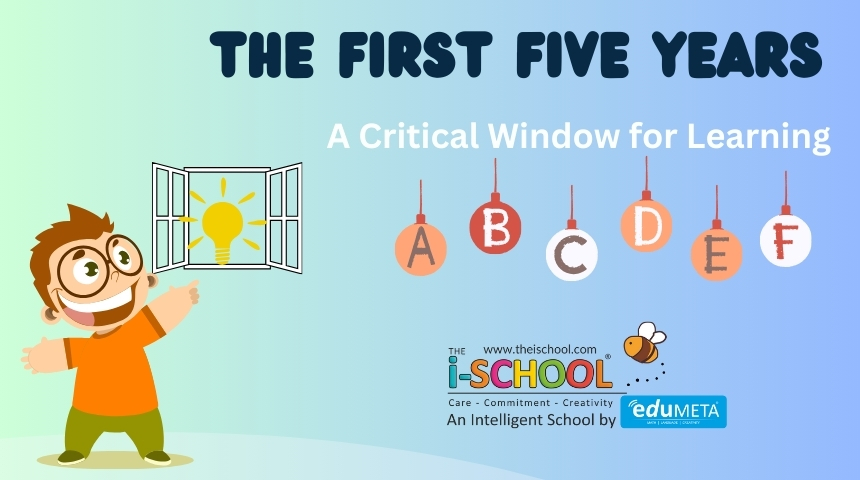The First Five Years: A Critical Window For Learning

The first five years of a child’s life are often referred to as the “critical window” for learning. This period is characterized by rapid brain development and a tremendous capacity for absorbing information. At eduMETA THE i-SCHOOL, we understand the importance of these early years and strive to provide an environment that maximizes each child’s potential. This article explores why the first five years are crucial for learning and how we can support children during this formative period.
Why the First Five Years Are Crucial
1. Brain Development:
- During the first five years, a child’s brain undergoes significant growth, forming neural connections at a faster rate than at any other time in life.
- By age five, the brain reaches about 90% of its adult size, making this period vital for cognitive development.
2. Language Acquisition:
- Children are highly receptive to language during the early years. They rapidly learn to understand and speak their native language(s).
- Early exposure to rich language experiences, such as reading, singing, and conversation, lays the foundation for literacy and communication skills.
3. Social and Emotional Development:
- Early interactions with caregivers and peers help children develop social skills, emotional regulation, and a sense of security.
- Positive relationships and experiences during these years shape a child’s ability to form healthy relationships in the future.
4. Motor Skills:
- Both fine and gross motor skills develop rapidly during the early years, enabling children to explore their environment and gain independence.
- Activities that promote movement and manipulation, such as crawling, walking, drawing, and building, are essential for physical development.
How eduMETA THE i-SCHOOL Supports Early Learning
1. Play-Based Learning:
- We believe that play is the most effective way for young children to learn. Our curriculum is designed to incorporate play-based activities that stimulate curiosity and creativity.
- Through guided play, children explore concepts in literacy, numeracy, science, and the arts, building a strong foundation for future learning.
2. Language-Rich Environment:
- Our classrooms are filled with books, storytelling, songs, and conversations to enhance language development.
- Teachers engage children in discussions, read aloud daily, and encourage expressive language through various activities.
3. Social Interaction:
- We provide numerous opportunities for children to interact with their peers in a positive and supportive environment.
- Group activities, cooperative play, and structured social interactions help children develop empathy, teamwork, and communication skills.
4. Physical Activity:
- Daily physical activities are integrated into our routine to support motor skills development. Children participate in outdoor play, dance, and exercises that promote coordination and strength.
- Fine motor activities, such as puzzles, drawing, and crafts, are also included to refine hand-eye coordination and dexterity.
5. Emotional Support:
- Our teachers are trained to create a nurturing and emotionally supportive atmosphere where children feel safe and valued.
- We focus on building strong, positive relationships between teachers and students, fostering a sense of trust and belonging.
6. Individualized Learning:
- We recognize that each child is unique and develops at their own pace. Our approach is tailored to meet the individual needs of every child.
- Through careful observation and assessment, we identify each child’s strengths and areas for growth, providing personalized support and encouragement.
The Role of Parents in Early Learning
1. Active Engagement:
- Parents play a critical role in their child’s early learning journey. Engaging in activities such as reading together, playing educational games, and having meaningful conversations can significantly enhance a child’s development.
- At eduMETA THE i-SCHOOL, we encourage parents to be active participants in their child’s education and provide resources to support learning at home.
2. Creating a Positive Home Environment:
- A nurturing and stimulating home environment complements the learning experiences at school. Providing a safe space for exploration, setting routines, and offering emotional support are key factors in promoting healthy development.
Conclusion
The first five years of a child’s life are indeed a critical window for learning. At eduMETA THE i-SCHOOL, we are committed to providing a rich, supportive, and stimulating environment that nurtures each child’s development during these formative years. By focusing on play-based learning, language development, social interaction, physical activity, and emotional support, we help children build a strong foundation for lifelong learning and success. Together with parents, we strive to make the most of this critical window, ensuring that every child reaches their full potential.
